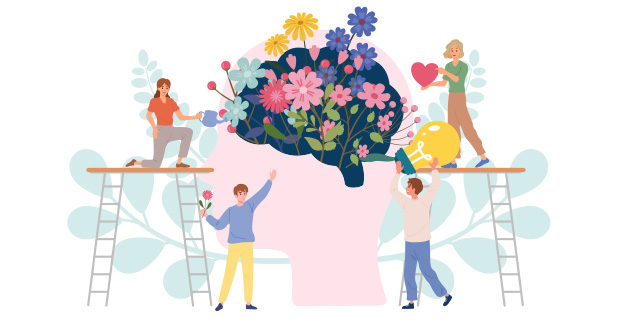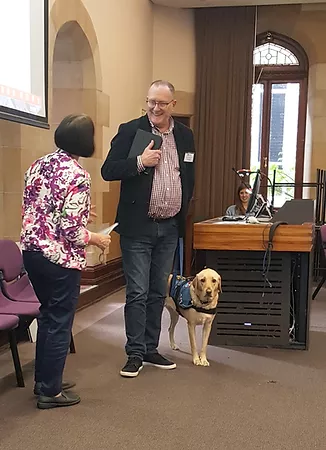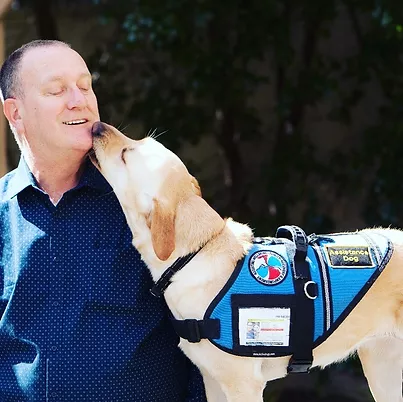Diagnosed with dementia at 55, Phil Hazell is now a passionate advocate for spreading awareness of the disease.
Each year, over 4.6 million people worldwide are diagnosed with a form of dementia.
While Phil's father also had dementia, though a different type, his diagnosis came as a complete shock to him and his wife, Jan.
"I knew something wasn't right when I had to write down the round of drinks in the pub when it was my shout," Phil shares.
"It was still a hell of a surprise, particularly the way we were told.
"The specialist just said, 'well, you've got dementia. Go and get your affairs in order'."
Dementia is the second leading cause of death among Australians, and those diagnosed are expected to live up to eight years after diagnosis.
But the negative news didn't stop him or his wife from trying to make the best of the situation.
They searched for a good GP who could guide them through the untrodden road, but three times heard the GP 'was at capacity'.
Later, when Phil became Chair of the Dementia Australia Advisory Committee, he learned that most recently diagnosed people struggle to find a GP simply because doctors do not wish to see them.
"That made it difficult, but fortunately, I'm fairly motivated," he says.
He says finding support service Dementia Australia allowed him to reinvent himself through advocacy, an opportunity he took with both hands since his retirement 12 months after diagnosis.
He's spoken on topics people living with dementia come across, such as discrimination, at prominent locations like the Sydney Opera House.
"I'm basically a full-time advocate," Phil says.
In the early months after his diagnosis, Phil fell down the stairs wearing socks on a timber floor.
The ambulance took him to the hospital, where the neurologist told him to take on a full-time carer or to move into a residential home.
"Jan and I both burst into tears," Phil says.
"But the doctor's response was, 'with respect; I don't think you have any idea how difficult it is to live well with dementia'.
"The medical world left Jan and I feeling particularly isolated. Every corner we seemed to go around, we found that no one was listening."
Instead, they fixed the floor using textured plastic to add more grip, and he hasn't fallen since.
Over those five years, Phil found a GP, psychiatrist and physiotherapist to help him manage his day-to-day life.
He says that wanting to prevent falls and managing knee joint pain were the primary motivators to see a physiotherapist, and recommends everyone visit one regularly.
"I now feel more confident using stairs and better at judging distance from one step to the next.
"Because whatever's happening, like if you're in severe pain, it does affect your dementia, and then it makes it even worse.
"So alleviating all that just makes it a lot safer and less stressful."
Yet Phil faces other symptoms related to dementia that sometimes make his life more difficult.
For one, he's lost the ability to drive or go boating; activities he used to love.
"As you can imagine, I can become quite anxious and confused," he says.
"And my circle of friends certainly diminished – it's not unusual for someone to lose their friends, the majority or all of them.
"I lost most of mine, which made the whole process a lot more difficult to navigate."
While Dementia Australia has provided him with a supportive network, his psychiatrist suggested that Phil get an assistance dog to help him during more challenging moments.
Together with his assistance dog, Sara, and his loving wife, he recently celebrated his 63rd birthday.
He was one of the first people living with dementia to get an assistance dog and has an extraordinary relationship with her.
"Sara is fantastic! She helps me find things like my keys, phone, wallet and TV remote.
"When I'm feeling nervous and confused, Sara seems to get this – she'll nuzzle close into me, being affectionate until she sees I have calmed.
"Then the confusion will lift, and I can think again more clearly."
As Phil flies around the world to give awareness speeches on dementia, Sara is always close by.
She's followed him on 56 cabin flights and even takes her own ticket in her mouth.
"Through Sara's presence, I find that people are more receptive to understanding the experience of dementia," he said.
Do you have an idea for a story?Email [email protected]
 Aged Care Insite Australia's number one aged care news source
Aged Care Insite Australia's number one aged care news source



